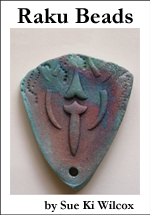|
|
|
April 2006 Issue
#38 In This Issue ~-~-~-~-~-~-~-~-~-~-~-~-~-~-~-~-~-~-~-~-~-~-~-~-~-~-~-~-~-~ * Crawling Glaze Cure Loretta M. writes:
I have your Raku glaze book http://www.rakuglazes.com and have tried some of the glazes. I know that everyone fires differently etc. but the last couple of years I have been having trouble with my glazes crawling - sort of! This has been happening with tried and true glazes that I have used for years. These are mostly the gloss glazes like Del Favero Luster and Reynolds Wrap and a few others. These are glazes that were very successful in the past. They also have a large amount of Gerstley Borate in them. Could this be the problem? Someone suggested that these glazes may be low in clay and I should maybe add some ball clay. Any thoughts on this? I'd greatly appreciate your help on this. Love the newsletter! ~~-~-~-~-~-~-~-~-~-~-~-~-~-~-~-~-~-~-~-~-~-~-~-~-~-~-~-~-~- Books, Music, Videos and that’s just the start. Amazon sells more than books! Help support this newsletter by using this link: http://www.garyrferguson.com/amazon ~~-~-~-~-~-~-~-~-~-~-~-~-~-~-~-~-~-~-~-~-~-~-~-~-~-~-~-~-~- There are several things that can cause a glaze to crawl. One of the most common is dirty/dusty bisque ware. If your bisque pieces have been sitting around for a while, especially in a dusty location, like say a pottery studio, they have probably picked up a layer of grime. If this grime is not removed before the glaze is applied, you can get a crawling result. The easiest way to fix this is just use a damp sponge and clean off the bisque pieces and let them dry before you glaze them. Another cause of crawling is a poor clay to glaze fit. In this case the glaze would be shrinking far more than the clay body. So one question is have you changed clay bodies? If so, this could be the culprit. Using glazes that have been mixed with water for a long period of time can cause another fit problem, especially with glazes that are high in Gerstley Borate. You might try mixing a fresh batch of the problem glaze and see if you get the same result. Finally another cause can be from the firing process itself. The crawling could be caused from severe bubbling of the glaze before it matures resulting in areas of the pieces missing glaze. Severe bubbling can be the caused by a very fast firing or firing in a strong reduction environment. Finally another thought it to just enjoy the result. Some artists actually cause the crawling effect on purpose with their glaze to create a very unique look. Hopefully this helps. ~-~-~-~-~-~-~-~-~-~-~-~-~-~-~-~-~-~-~-~-~-~-~-~-~-~-~-~-~-~ "Our class fired again last night, and the instructor followed your tips and voila. Boy do we have copper. Its great knowing we can do it, and I really appreciate your help. Thanks again!"-Shannon P. http://www.rakusecrets.com ~-~-~-~-~-~-~-~-~-~-~-~-~-~-~-~-~-~-~-~-~-~-~-~-~-~-~-~-~-~ . |
||
|
Books
Learn Dozens of Hints, Tips and Techniques in the free monthly newsletter Just
Raku Privacy Policy - Your email address or other personal information will only be used for this newsletter. It will never be given, rented, or sold to any other party for any other purposed. |
||
|
Gary R. Ferguson - Raku Artist (c) Copyright 2006, Gary R. Ferguson |
||



